Our Research Projects
“Don’t value what we measure -> measure what we value.” – Bob Mislevey
 Das HIKOF-DL Projekt hat zum Ziel Hochschulen und Firmen dabei zu unterstützen, das Potential der durch die COVID-19-Pandemie rasant gewachsenen Datenbestände der Online-Lehre mittels
Künstlicher Intelligenz (KI) zu analysieren und in hoch informatives und kompetenzorientiertes Feedback für Studierende umzuwandeln. Dabei werden nicht grundständig neue Interventionen erforscht, sondern vielmehr etablierte Open-Source-Softwarelösungen von der internationalen Learning Analytics-Community sowie aus erfolgreichen BMBF-Projekten miteinander kombiniert und in Anwendung gebracht. Im Rahmen des Projektes wird ein projektbegleitender Beirat berufen, der die Anwendbarkeit der Technologien und des Wissens in der Praxis beaufsichtigt.
Technologie und Innovation
Das Projekt baut auf der reichhaltigen Expertise und Unterstützung der Society of Learning Analytics Research (SoLAR) auf und verwendet erprobte Regelungen, Methoden und etablierte Open-Source-Softwarelösungen. Diese werden mit aktuellen Methoden und digitalen Werkzeugen der psychometrischen Kompetenzdiagnostik verknüpft. Konkret wird die international etablierte Learning Analytics-Software OnTask mit der in Deutschland entwickelten KAT-HS-Assessment-
Software zu einem neuen wirkungsmächtigen Open Source Tool für hoch informatives und kompetenzorientiertes formatives wie summatives Feedback kombiniert.
Anwendungsbereich und Nutzen der neuen Technologie
Das HIKOF-DL Projekt legt seinen Fokus auf die Weiterentwicklung bestehender Interventionen zur Verbesserung der Online-Lehre und deren Transfer in die Lehr- und Lernpraxis. Perspektivisch
wird eine langfristige Etablierung von KI in der Aus- und Weiterbildung angestrebt. Das neu entstehende Feedback-System wird an der Goethe-Universität durch die Partner GU-SD und DIPF implementiert und mit dem Partner GU-PSY in einer der größten und hinsichtlich der
Teilnehmenden heterogensten Vorlesungen der Universität mit rund 1000 Studierenden evaluiert.
Die Ergebnisse werden zweimal jährlich dem Beirat aus verschieden Unternehmen vorgestellt und
auf dessen Anwendbarkeit im wirtschaftlichen Bereich bewertet.
Hier geht's zur Projektwebseite: https://hikof.uni-frankfurt.de/
Das HIKOF-DL Projekt hat zum Ziel Hochschulen und Firmen dabei zu unterstützen, das Potential der durch die COVID-19-Pandemie rasant gewachsenen Datenbestände der Online-Lehre mittels
Künstlicher Intelligenz (KI) zu analysieren und in hoch informatives und kompetenzorientiertes Feedback für Studierende umzuwandeln. Dabei werden nicht grundständig neue Interventionen erforscht, sondern vielmehr etablierte Open-Source-Softwarelösungen von der internationalen Learning Analytics-Community sowie aus erfolgreichen BMBF-Projekten miteinander kombiniert und in Anwendung gebracht. Im Rahmen des Projektes wird ein projektbegleitender Beirat berufen, der die Anwendbarkeit der Technologien und des Wissens in der Praxis beaufsichtigt.
Technologie und Innovation
Das Projekt baut auf der reichhaltigen Expertise und Unterstützung der Society of Learning Analytics Research (SoLAR) auf und verwendet erprobte Regelungen, Methoden und etablierte Open-Source-Softwarelösungen. Diese werden mit aktuellen Methoden und digitalen Werkzeugen der psychometrischen Kompetenzdiagnostik verknüpft. Konkret wird die international etablierte Learning Analytics-Software OnTask mit der in Deutschland entwickelten KAT-HS-Assessment-
Software zu einem neuen wirkungsmächtigen Open Source Tool für hoch informatives und kompetenzorientiertes formatives wie summatives Feedback kombiniert.
Anwendungsbereich und Nutzen der neuen Technologie
Das HIKOF-DL Projekt legt seinen Fokus auf die Weiterentwicklung bestehender Interventionen zur Verbesserung der Online-Lehre und deren Transfer in die Lehr- und Lernpraxis. Perspektivisch
wird eine langfristige Etablierung von KI in der Aus- und Weiterbildung angestrebt. Das neu entstehende Feedback-System wird an der Goethe-Universität durch die Partner GU-SD und DIPF implementiert und mit dem Partner GU-PSY in einer der größten und hinsichtlich der
Teilnehmenden heterogensten Vorlesungen der Universität mit rund 1000 Studierenden evaluiert.
Die Ergebnisse werden zweimal jährlich dem Beirat aus verschieden Unternehmen vorgestellt und
auf dessen Anwendbarkeit im wirtschaftlichen Bereich bewertet.
Hier geht's zur Projektwebseite: https://hikof.uni-frankfurt.de/ - a theory of learning, and based thereupon,
- a model of competence development and
- methodologies that allow for a continuous assessment of students’ learning over sequences of learning activities and subsequent mapping to students’ competence development.
 Drawing on these advances, we aim to investigate the extent to which data originating from students interactions with digital technologies in mathematics and science classrooms can be used to 1) continuously evaluate individual students’ learning, 2) reconstruct trajectories in their learning over sequences of learning activities and 3) identify those trajectories that align with the development of competence in mathematics and science.
In doing so, we aim to provide the theoretical and methodological foundations for a stronger individualization of mathematics and science education to support all students in developing the competence needed for societal, cultural and occupational participation and thus meeting educational goals.
Drawing on these advances, we aim to investigate the extent to which data originating from students interactions with digital technologies in mathematics and science classrooms can be used to 1) continuously evaluate individual students’ learning, 2) reconstruct trajectories in their learning over sequences of learning activities and 3) identify those trajectories that align with the development of competence in mathematics and science.
In doing so, we aim to provide the theoretical and methodological foundations for a stronger individualization of mathematics and science education to support all students in developing the competence needed for societal, cultural and occupational participation and thus meeting educational goals.  The DELTA School is a overarching initiative that aims to combine digital education at Goethe University, in combination with those at the DIPF and studiumdigitale. The DELTA School can draw on a wide range of preliminary work, as well as many prototypes and expertise on the part of the DIPF (EduTec, EduCS, TBA) and a competence model for the development of digital key skills from studiumDigitale, as well as existing events from the Master's specialisation Educational Technologies of the Department 12 Mathematics / Computer Science.
The DELTA School is a overarching initiative that aims to combine digital education at Goethe University, in combination with those at the DIPF and studiumdigitale. The DELTA School can draw on a wide range of preliminary work, as well as many prototypes and expertise on the part of the DIPF (EduTec, EduCS, TBA) and a competence model for the development of digital key skills from studiumDigitale, as well as existing events from the Master's specialisation Educational Technologies of the Department 12 Mathematics / Computer Science. 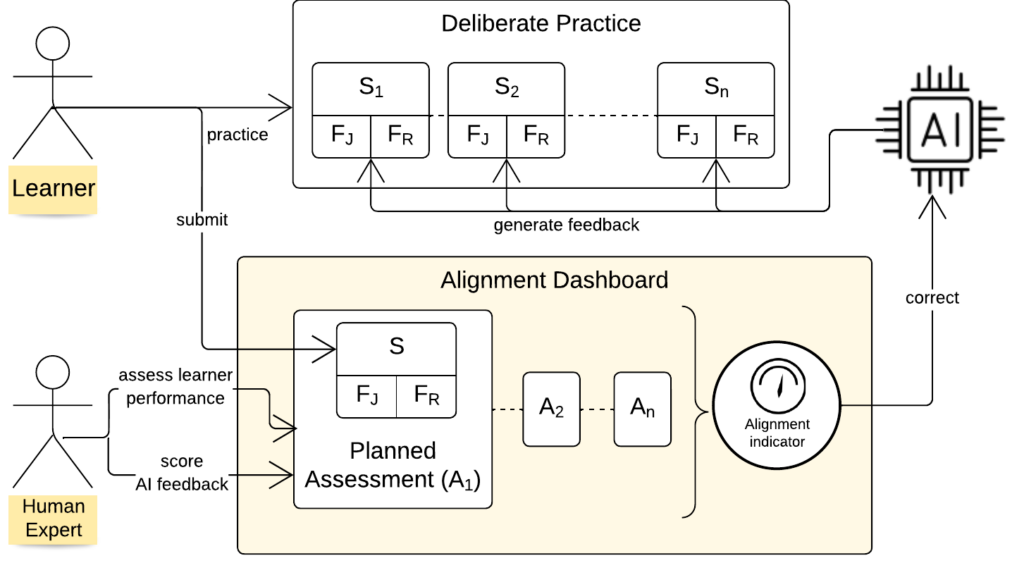
Completed Research Projects
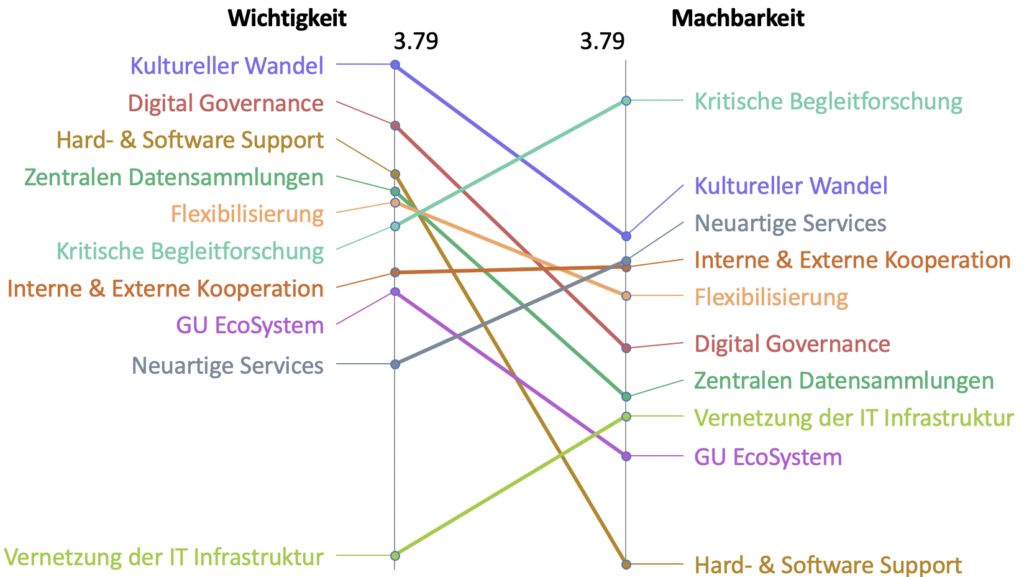 The realization of the DELTA project (Towards Digital Education with modern Learning Technologies and Assessment approaches) takes place in 5 stages:
The realization of the DELTA project (Towards Digital Education with modern Learning Technologies and Assessment approaches) takes place in 5 stages:
- Writing personas: creation of so-called “personas” which reflect key users in the future of digital education at the Goethe University. Personas are developed on the basis of different empirical data – to this end, survey and structured interviews will be used.
- Expert group concept mapping study: An expert GCM study will be run to elicit success criteria for the development of a digital education infrastructure at the Goethe University.
- Innovation workshops: organisation of innovation workshops involving key actors at the Goethe University, external research institutes, the state ministry of education in Hesse and international experts, to formulate a plan for digital education at the Goethe University.
- Fruits & challenge workshops: organisation of workshops for the identification of so-called “low hanging fruits“, that is quickly accessible opportunities and long-term challenges to digital education at the Goethe University.
- DELTA report and conference: organisation of a wrap-up conference which summarises project outcomes and necessary activities for achieving DELTA plan objectives by 2025. The DELTA report will be handed to the President of the Goethe University at the conference.
Mind map - Essential functions
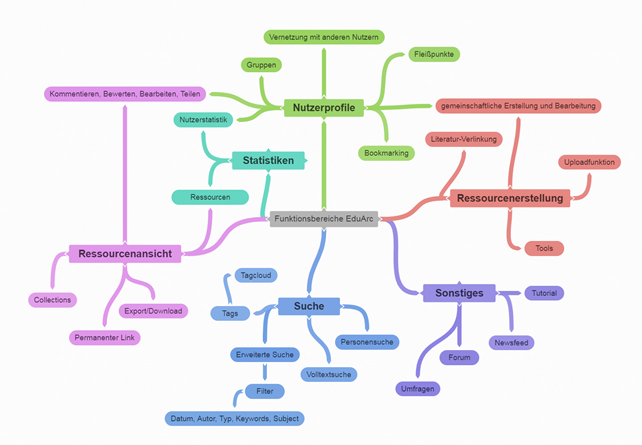 Digital Education Architecture
Open learning resources in distributed learning Infrastructures - EduArc
Digital Education Architecture
Open learning resources in distributed learning Infrastructures - EduArc
- Blees, Ingo, Hirschmann, Doris, Kühnlenz, Axel, Rittberger, Marc, Schulte, Jolika, Cohen, Nadia, … Khenkitisack, Phoutsada. (2016). Machbarkeitsstudie zum Aufbau und Betrieb von OER-Infrastrukturen in der Bildung. Frankfurt: Deutsches Institut für Internationale Pädagogische Forschung.
- Drachsler, H., Verbert, K., Santos, O. C., & Manouselis, N. (2015). Panorama of Recommender Systems to Support Learning. In F. Ricci, L. Rokach, & B. Shapira (Hrsg.), Recommender Systems Handbook (S. 421–451). Springer, Boston, MA.
- Euler, D., Hasanbegovic, J., Kerres, M., & Seufert, S. (2006). Handbuch der Kompetenzentwicklung für eLearning Innovationen: Eine Handlungsorientierung für innovative Bildungsarbeit in der Hochschule. Bern: Huber.
- Kerres, M. (2015). E-Learning vs. Digitalisierung der Bildung: Neues Label oder neues Paradigma? In A. Hohenstein & K. Wilbers (Hrsg.), Handbuch E-Learning. Köln: Deutscher Wirtschaftsdienst.
- Kerres, M., Getto, B., & Kunzendorf, M. (2010). RuhrCampusOnline: Strategische Hochschulkooperation in der Universitätsallianz Metropole Ruhr. Zeitschrift für Hochschulentwicklung, 5.
- Kerres, M., & Heinen, R. (2015). Open informational ecosystems: The missing link for sharing resources for education. Interna- tional Review of Research in Open and Distributed Learning, 16.
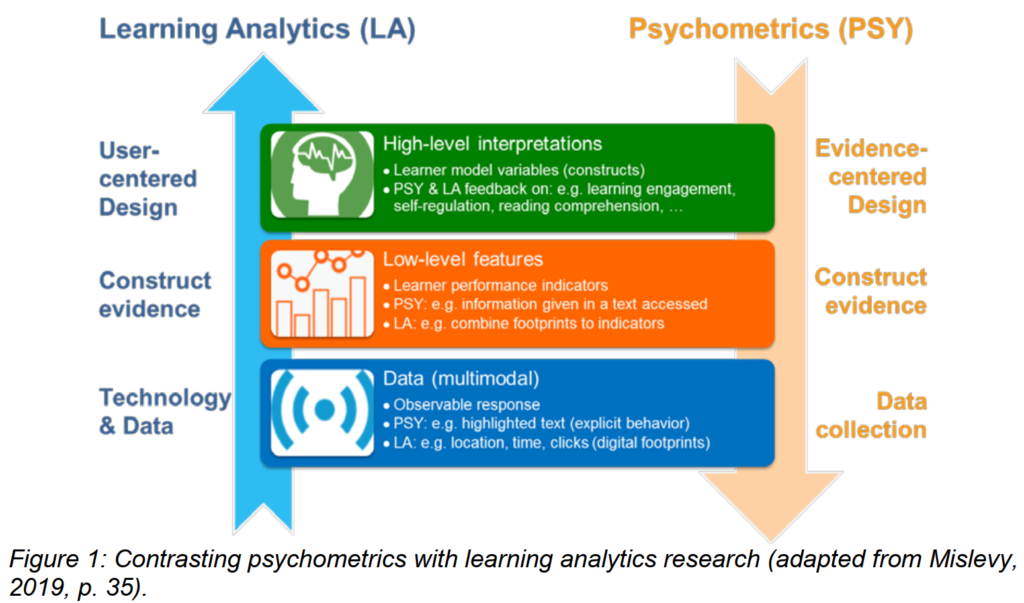 Education in a digitalized world opens the door for observing actual learning behavior with a fine-grained resolution. The proposed network of excellence investigates what is needed to release “computational psychometrics” (cf. von Davier, 2017) for formative assessment. We therefore will investigate how online-trace data as compared to standardized psychometric measures can be used to shed light on the learner’s knowledge, skills, and attributes that are in operation when using digital learning environments in higher education. For instance, timing behavior may be a useful indicator to evaluate individual learning engagement (cf. Nguyen, Huptych, & Rienties, 2018), and learning trajectories (e.g., semantic coherence of selected texts) may reflect self-regulation (see also Aleven, Roll, McLaren, & Koedinger, 2010; Winne, 2017).
For this purpose, the pedagogy concept and the design of the learning environment need to be closely aligned. That means that after specifying the learning outcomes of a course, we do not only need to define the assessment thereafter, but also need to think about potential learning analytics indicators that provide valuable insights into the state of the learner (Schneider et al., 2018). For this, the student’s learning process is inherently tied to the use of the learning environment for receiving, producing and exchanging information. This allows observing meaningful learning behavior that can be used to make inferences about the learner status and for providing feedback (formative assessment). To validate inferences based on learning analytics indicators well-proven classical standardized assessment instruments can be used as criteria. Thereby the DiFA project integrates methodological perspectives from educational assessment and learning analytics to develop new kinds of non-invasive assessment (“stealth assessment”, Shute, 2011) by exploiting digital trace data. Findings of this research are highly relevant for a better understanding learner’s behavior, learning outcomes and for providing individual feedback automatically to learners in digital environments.
The educational context of proposed project is initial and further teacher education. Within the DiFA project, we aim to develop an online qualification program for German teachers (students and professionals) on digital education. We can therefore reuse various learning materials that the consortium developed over the past years. This online qualification program will include various interactive online learning opportunities that will produce vast amounts of digital trace data.
Funding: Leibniz Kooperative Excellence
Education in a digitalized world opens the door for observing actual learning behavior with a fine-grained resolution. The proposed network of excellence investigates what is needed to release “computational psychometrics” (cf. von Davier, 2017) for formative assessment. We therefore will investigate how online-trace data as compared to standardized psychometric measures can be used to shed light on the learner’s knowledge, skills, and attributes that are in operation when using digital learning environments in higher education. For instance, timing behavior may be a useful indicator to evaluate individual learning engagement (cf. Nguyen, Huptych, & Rienties, 2018), and learning trajectories (e.g., semantic coherence of selected texts) may reflect self-regulation (see also Aleven, Roll, McLaren, & Koedinger, 2010; Winne, 2017).
For this purpose, the pedagogy concept and the design of the learning environment need to be closely aligned. That means that after specifying the learning outcomes of a course, we do not only need to define the assessment thereafter, but also need to think about potential learning analytics indicators that provide valuable insights into the state of the learner (Schneider et al., 2018). For this, the student’s learning process is inherently tied to the use of the learning environment for receiving, producing and exchanging information. This allows observing meaningful learning behavior that can be used to make inferences about the learner status and for providing feedback (formative assessment). To validate inferences based on learning analytics indicators well-proven classical standardized assessment instruments can be used as criteria. Thereby the DiFA project integrates methodological perspectives from educational assessment and learning analytics to develop new kinds of non-invasive assessment (“stealth assessment”, Shute, 2011) by exploiting digital trace data. Findings of this research are highly relevant for a better understanding learner’s behavior, learning outcomes and for providing individual feedback automatically to learners in digital environments.
The educational context of proposed project is initial and further teacher education. Within the DiFA project, we aim to develop an online qualification program for German teachers (students and professionals) on digital education. We can therefore reuse various learning materials that the consortium developed over the past years. This online qualification program will include various interactive online learning opportunities that will produce vast amounts of digital trace data.
Funding: Leibniz Kooperative Excellence  Aktuelle technologische Entwicklungen verändern diese Situation:
Aktuelle technologische Entwicklungen verändern diese Situation:
- Mixed, augmented und virtual reality ermöglichen es, immersive Lern- und Übungsräume zu schaffen
- Moderne Sensortechnologien können feingranular Bewegungen nachverfolgen und aufzeichnen
- Big Data Methoden und ihre Anwendung in Learning Analytics können große Datenmengen analysieren und auswerten, was insbesondere bei datenintensiven Lernvorgängen, wie der Echtzeit-Analyse psychomotorischer Fähigkeiten unabdingbar ist
- Maschinelle Lernverfahren (z.B. Reinforcement/Deep Learning) und generative Verfahren der künstlichen Intelligenz (z.B. generative adversarial networks) können große Datenmengen interpretieren, schlussfolgern und individuelles Feedback generieren
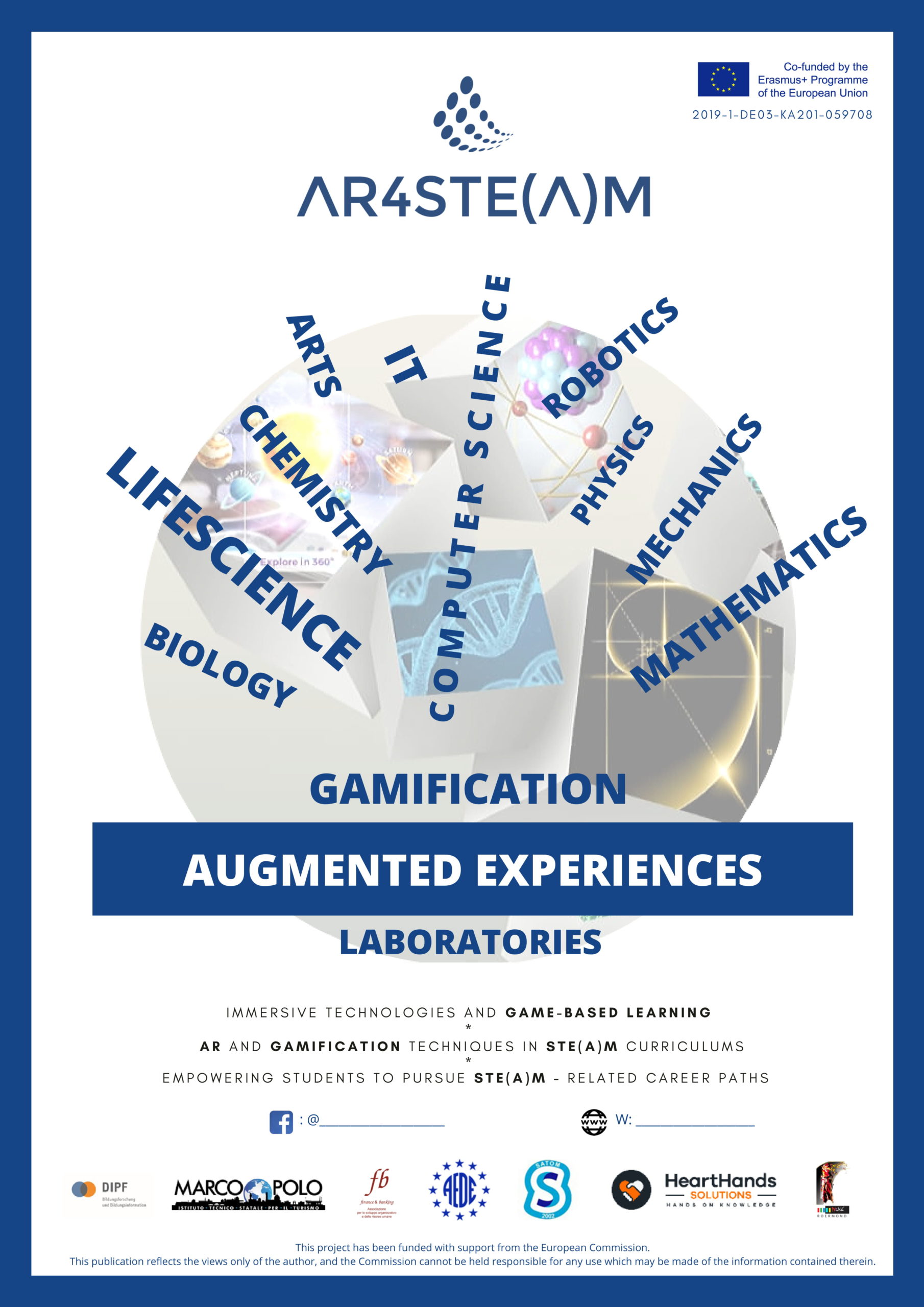 Nowadays, competence requirements have changed with more jobs being subject to automation, technologies playing a bigger role in all areas of work and life, and entrepreneurial, social and civic competences becoming more relevant in order to ensure resilience and ability to adapt to change. Digitization affects how people live, interact, study and work. This makes investing in one’s digital skills throughout life of the utmost importance. As a consequence, education systems needs to adapt to this reality. Innovation is ‘extremely relevant’ for meeting the education sector’s needs and digital technology has huge, untapped potential for improving education, especially in STEM subjects.
Nowadays, competence requirements have changed with more jobs being subject to automation, technologies playing a bigger role in all areas of work and life, and entrepreneurial, social and civic competences becoming more relevant in order to ensure resilience and ability to adapt to change. Digitization affects how people live, interact, study and work. This makes investing in one’s digital skills throughout life of the utmost importance. As a consequence, education systems needs to adapt to this reality. Innovation is ‘extremely relevant’ for meeting the education sector’s needs and digital technology has huge, untapped potential for improving education, especially in STEM subjects.
With the AR4STE(A)M project the Educational Technologies Team tackles these Issue by leading a strategic partnership supported by the European Commission in order to raise awareness on the importance of choosing STE(A)M studies for pursuing successful careers, especially among young students. Over the course of 2, 5 years the Team will work – together with 6 Partners from 6 EU countries – to give school teachers innovative instruments and tools to overcome the traditional method of teaching and learning engaging students to learn while enjoying. Supporting educational institutions in integrating immersive technologies and GBL for teaching STE(A)M within their curricula.
Funding: Erasmus+
Basierend auf ersten Forschungsergebnissen rund um das SERNE -Selfregulation Widget haben wir zusammen mit Prof. Dr. Garvin Brod von der DIPF Abteilung Bildung und Entwicklung ein Projekt zur Unterstützung von selbstregulierten Lernenprozessen für Schüler*Innen im HomeSchooling einwerben können. Das PROMPT Projekt wird durch das Distr@l – Förderprogramm des Hessische Ministerium für Digitale Strategie und Entwicklung gefördert.

Unterstützung des Selbstreguliertes Lernen fällt insbesondere jüngeren Schülerinnen und Schülern schwer. Das Projekt PROMPT hat das Ziel, die Erkenntnisse aus der Forschung zur Verbesserung von selbstreguliertem Lernen in digitalen Lernumgebungen in die Anwendung bei Schulkindern zu überführen. Dieses Wissen soll möglichst breit zugänglich gemacht werden, sodass es Unternehmen der Bildungswirtschaft und Bildungsinstitutionen unmittelbar für neue Produkte oder zur Verbesserung bestehender Anwendungen nutzen können. Einen zentralen Aspekt dieses Wissenstransfers soll ein Prototyp einer kindgerechten Lernplanungs-App darstellen. Dieser Prototyp soll die wissenschaftlichen Erkenntnisse, die für eine Verbesserung des selbstregulierten Lernens mit Lern-Apps bei Schulkindern wichtig sind, praktisch umsetzen und illustrieren. Anbieter und Nutzer jeglicher Lern-Apps können auf dieses Instrument zurückgreifen und für ihre Zwecke adaptieren. Im Projekt erfolgt eine ausführliche, mehrschrittige Optimierungsforschung zur Gestaltung der Lernplanungs-App, sodass diese größtmögliche Effektivität besitzt. Diese Optimierung besteht zunächst aus einer Reihe von kleineren Randomized Controlled Trials (RCTs), in denen die verschiedenen inhaltlichen Komponenten der App (Lernzielformulierung, Lernzielmotivation, Wenn-Dann-Plan zum Umgang mit Hindernissen bei der Zielerreichung, Überwachung des Lernfortschritts) systematisch variiert werden, um zu überprüfen, welche Kombination von Komponenten die größtmögliche Effektivität hat. Die vielversprechendsten Kombinationen werden im Anschluss in einem großen RCT in einer repräsentativen Stichprobe überprüft, um die Effektivität des Prototyps wissenschaftlich belastbar zu validieren. Abschließend wird die finale Version des Prototyps für die breite Nutzbarkeit und Zugänglichkeit für Unternehmen und Bildungsinstitutionen aufbereitet und als Open Educational Resource verbreitet.
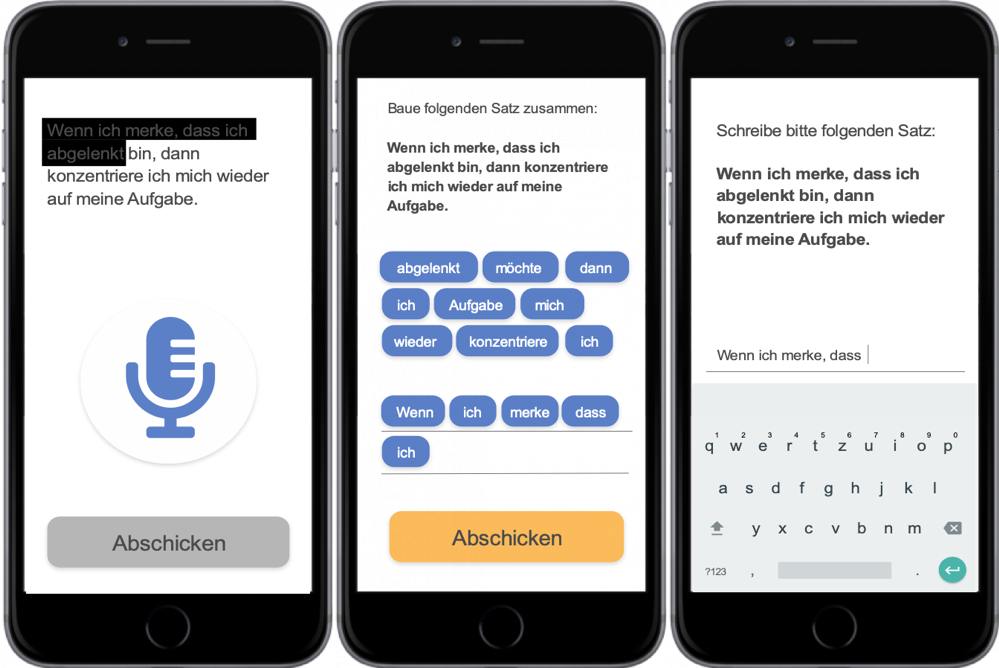
Basierend auf ersten Forschungsergebnissen rund um die Trusted Learning Analytics Infrastructure der EduTec Gruppe, haben wir zusammen mit Prof. Dr. Knut Neumann from Leibniz-Institut für die Pädagogik der Naturwissenschaften und Mathematik (IPN) in Kiel und Prof. Dr. Nikol Rummel von der Ruhr-Universität Bochum ein Projekt zur Analyse und Förderung von Lernverläufen zur Entwicklung von Kompetenzen (AFLEK) einwerben können. Das AFLEK Projekt wird durch das BMBF Programm Digitalisierung II - Forschung zur Gestaltung von Bildungsprozessen unter den Bedingungen des digitalen Wandels gefördert.
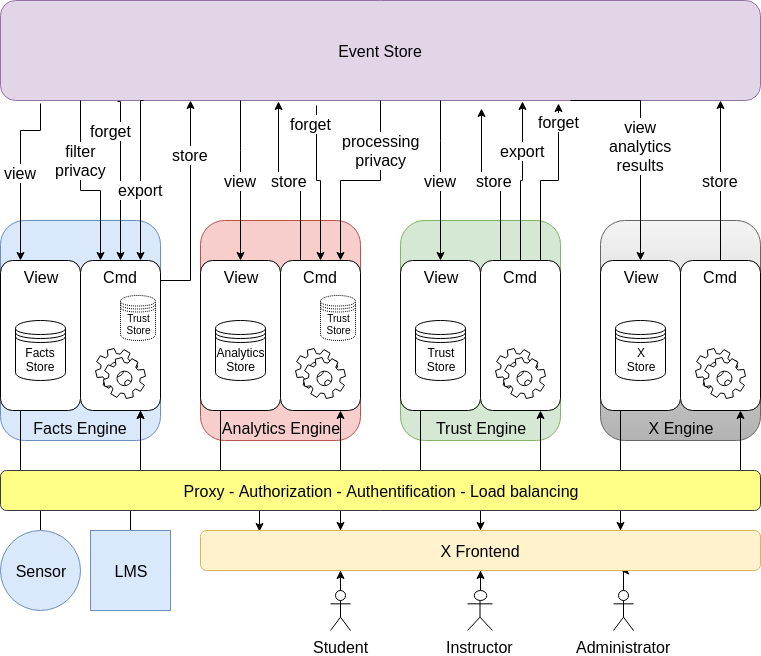
Digitalen Technologien wird ein hohes Potential für die Optimierung von Bildungsprozessen zugesprochen. Sie erlauben ein stärker personalisiertes Lernen, das es allen Schülerinnen und Schülern ermöglicht, die für eine gesellschaftliche und insbesondere berufliche Teilhabe erforderlichen Kompetenzen zu erwerben. Dies setzt voraus, dass Lernverläufe die nicht zu Kompetenzentwicklung (unproductive learning; vgl. Kapur, 2016) führen zeitnah erkannt werden und entsprechend darauf reagiert wird. Dies für alle Schülerinnen und Schüler zu leisten, ist für Lehrkräfte im herkömmlichen Unterricht nur schwer bis gar nicht möglich. Im Projekt „Learning Progression Analytics“ (LPA) sollen Erkenntnisse darüber gewonnen werden, wie die umfangreichen bei der Bearbeitung digitaler Lerneinheiten generierten Daten zu fachinhaltlichen Lernprozessen automatisch ausgewertet und der Lehrkraft in nahezu Echtzeit zur Verfügung gestellt werden können, um unproduktive Lernverläufe zeitnah zu erkennen, die ursächlichen Lernschwierigkeiten zu identifizieren und instruktionale Interventionen zu unterstützen, die die unproduktiven Lernverläufe in produktive überführen. Damit soll die Grundlage für die Entwicklung von Assistenzsystemen für Schülerinnen und Schüler bzw. Lehrkräfte und damit für personalisiertes Lernen im Schulunterricht geschaffen werden.
If you are interested in the products we have developed in the research projects navigate to the product page.
